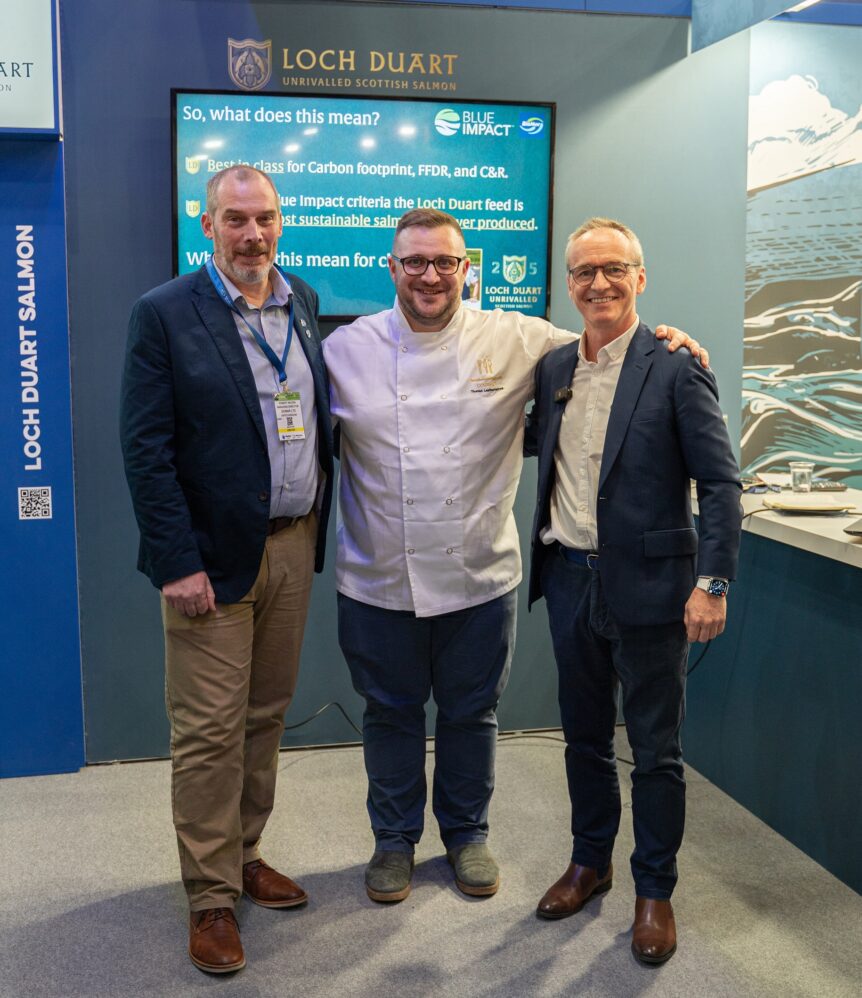Biomar’s Blue Impact feed reinforces Scottish salmon farms’ commitment to low impact farming and healthier fish.
Just one year since introducing its groundbreaking Blue Impact feed Loch Duart is celebrating its 25th anniversary by announcing that the new, improved diet means its salmon is now industry leading in health, low impact farming and purity. By maintaining high Omega-3 levels, further reducing its carbon footprint, taking the lead in lowering its Foraged Fish Dependency Ratio and triple cleaning the fish oils in its feed, Loch Duart salmon has set a new standard for salmon quality and environmental impact.
In the announcement, made at the Barcelona Seafood Expo 2024, Loch Duart shared the details of its new feed results with key customers, aquaculture experts, and suppliers.
Chris Orr, Sales Director of Loch Duart, said:
“Not all salmon are farmed equally and at Loch Duart, right from the very start 25 years ago, we’ve been committed to raising the standards of our industry by pioneering fish welfare and low-impact farming methods. Loch Duart Salmon’s bespoke Blue Impact diet, produced in partnership with our feed partners at Biomar, is a game-changer, which prioritises low-impact feed ingredients and has circular and restorative thinking at its heart. The new feed is now *56.5% more carbon-friendly than standard farmed salmon diets and with a new Foraged Fish Dependency Ratio (FFDR) of just 0.33 Loch Duart now has a net positive marine output.
“So what does this mean for chefs, restaurants and foodies? Well, our salmon isn’t just kinder on the planet, it’s healthier for customers too. The fish oil within the new feed is triple-cleaned, dramatically reducing dioxins, resulting in our feed having 67% fewer contaminants than standard farmed salmon diets. We are immensely proud to have taken this huge, positive step forward in our 25th anniversary year.”
Robert Wilson, Business Unit Director at BioMar UK, said:
“Our Blue Impact diets were introduced to drive real improvements in key sustainability areas where aquaculture can make a significant environmental difference, including reducing the CO2 footprint, dependency on wild stocks and increasing the use of circular ingredients. Loch Duart embraced the principle from day one switching their entire production to the new diet. We believe our Blue Impact diets are setting a new benchmark in sustainable feeds while maintaining the high quality standards that Loch Duart Salmon is known for.”
Loch Duart Salmon, founded in Sutherland in the North West of Scotland in 1999, has recently started harvesting the first group of fish which have solely been fed the new Blue Impact diet, throughout the time they have been raised on their farms. This means that from now on, all Loch Duart salmon are exceptionally healthy and low in natural contaminants. Loch Duart Salmon is supplied to leading hotels, Michelin-starred restaurants and retailers at home and across the world.
Chef Thomas Leatherbarrow who was at the announcement of the new, improved diet said: “I’ve been cooking with Loch Duart Salmon for years and the flavour profile is just unlike anything else; it’s a much healthier product to buy because its diet and bespoke feed mean it really is unrivalled tasting salmon.”
*SINTEF Report ‘Greenhouse gas emissions of Norwegian salmon products’ ((Authors U. Johansen, A.A. Nistad, F. Ziegler, S. Mehta, M. Langeland, Y. Wocken, Erik.S. Hognes) Published Nov 2022)
Find out more about Loch Duart’s new Blue Impact feed:
- 80% of salmon farming carbon emissions come from feed production: Loch Duart’s new feed is now 56.5% more carbon-friendly than standard farmed salmon diets
- Our bespoke, high marine content feed includes trimmings from MSC-approved or Marine Trust fisheries, turning what would be waste into valuable and healthy food for our salmon
- Loch Duart’s Foraged Fish Dependency Ratio (FFDR) dropped from 0.44 to 0.33 which is best in class for a premium salmon producer with industry-leading levels of Omega-3.
- By triple-cleaning the fish oil in our feed Loch Duart has considerably reduced Dioxins content: in fact, our new feed has 67% less dioxins than standard salmon diets.

